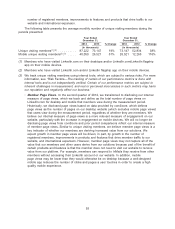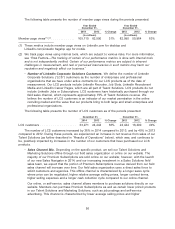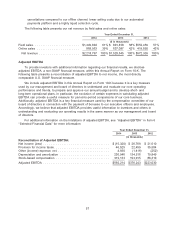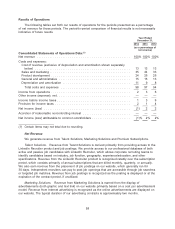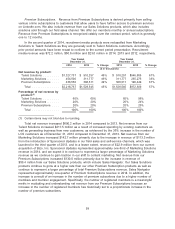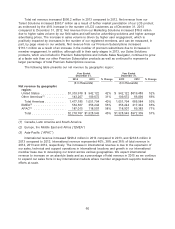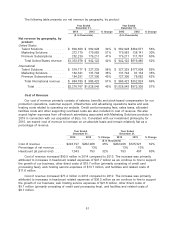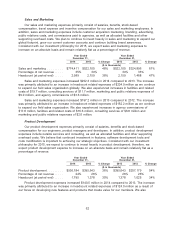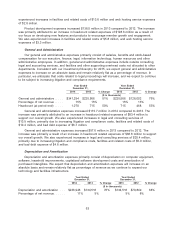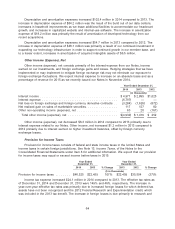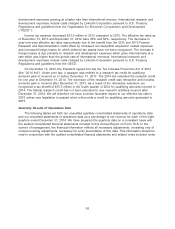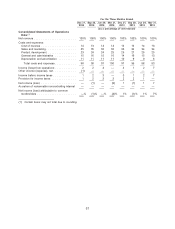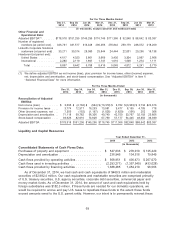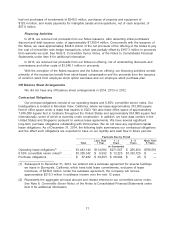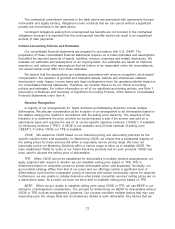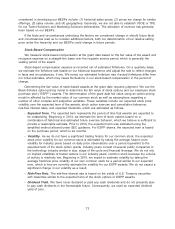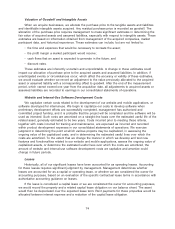LinkedIn 2014 Annual Report Download - page 67
Download and view the complete annual report
Please find page 67 of the 2014 LinkedIn annual report below. You can navigate through the pages in the report by either clicking on the pages listed below, or by using the keyword search tool below to find specific information within the annual report.development expenses growing at a faster rate than international revenue. International research and
development expenses include costs charged by LinkedIn Corporation pursuant to U.S. Treasury
Regulations and guidelines from the Organisation for Economic Co-operation and Development
(‘‘OECD’’).
Income tax expense decreased $13.0 million in 2013 compared to 2012. The effective tax rates as
of December 31, 2013 and December 31, 2012 were 46% and 62%, respectively. The decrease in
year-over-year effective tax rates was primarily due to the benefit from the 2012 and 2013 Federal
Research and Experimentation credit offset by increased non-deductible acquisition related expenses
and increased foreign losses for which deferred tax assets have not been recognized. The increase in
foreign losses is due primarily to research and development expenses which grew internationally at a
rate which was higher than the growth rate of international revenues. International research and
development expenses include costs charged by LinkedIn Corporation pursuant to U.S. Treasury
Regulations and guidelines from the OECD.
On December 19, 2014, the President signed into law the Tax Increase Prevention Act of 2014
(the ‘‘2014 Act’’). Under prior law, a taxpayer was entitled to a research tax credit for qualifying
amounts paid or incurred on or before December 31, 2013. The 2014 Act extended the research credit
for one year to December 31, 2014. The extension of the research credit was retroactive and includes
amounts paid or incurred after December 31, 2013. As a result of the retroactive extension, we
recognized a tax benefit of $15.5 million in the fourth quarter of 2014 for qualifying amounts incurred in
2014. The federal research credit has not been extended to new research activities incurred after
December 31, 2014. We will therefore not have a similar favorable impact to our effective tax rate in
2015 unless new legislation is passed which will provide a credit for qualifying amounts generated in
2015.
Quarterly Results of Operations Data
The following tables set forth our unaudited quarterly consolidated statements of operations data
and our unaudited statements of operations data as a percentage of net revenue for each of the eight
quarters ended December 31, 2014. We have prepared the quarterly data on a consistent basis with
the audited consolidated financial statements included in this Annual Report on Form 10-K. In the
opinion of management, the financial information reflects all necessary adjustments, consisting only of
normal recurring adjustments, necessary for a fair presentation of this data. This information should be
read in conjunction with the audited consolidated financial statements and related notes included under
65


